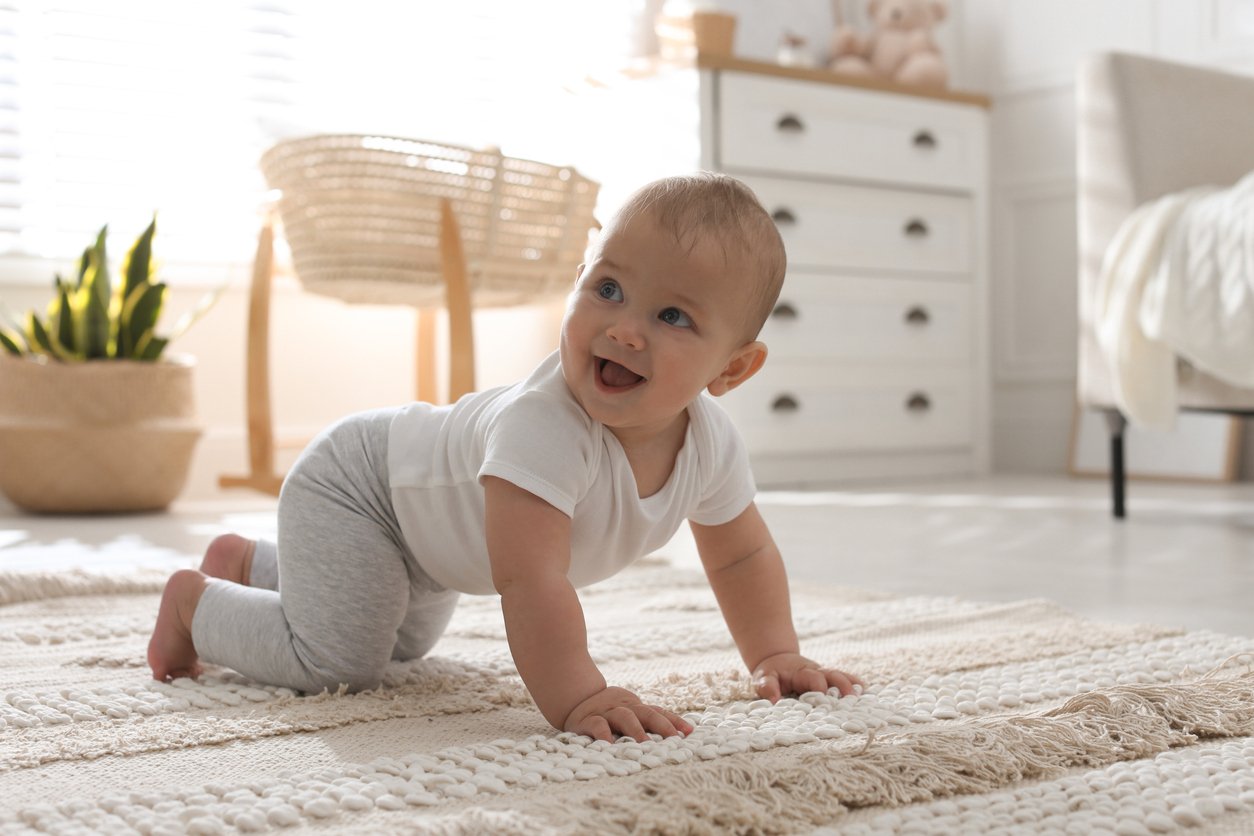
It’s an exciting milestone when your baby starts crawling for the first time because it opens up a whole new world of exploration for them. And it can be very fun as parents to watch them learn how to navigate and use their little bodies to start crawling around. But do you know why crawling is such an important milestone?
Today we’re going to explain why crawling is so beneficial for your baby’s development and what you should do if your baby managed to skip crawling and go straight on to walking.
Crawling Is About Much More Than Movement
It’s not the ability to move in and of itself that is important, but what crawling represents for your baby’s overall physical and sensory development. And sometimes babies skip crawling and just go straight on to walking. When that happens, parents tend to think that it means their baby is more advanced or is developing faster than other babies.
While it may be true that babies who skip crawling have developed a little faster than their peers, it actually puts them at a disadvantage because they miss out on gaining valuable developmental skills that will help them throughout their lives.
Crawling Promotes Gross Motor Skills
When your baby crawls, it exercises the muscles in their arms, legs, stomach, hips, neck and back. These muscles are important for all kinds of movements like walking, running, jumping, climbing and so on. It also helps build their coordination as they shift between using the left and right sides of their body to move.
Without a strong foundation of crawling to develop these muscles and coordination skills, activities like walking long distances, climbing stairs, or playing sports can become more challenging as they grow.
Crawling Builds Fine Motor Skills
Crawling is actually a very good way to build up your baby’s fine motor skills by developing strength and stability in the muscles of their fingers, hands, wrists, and forearms. Strength and dexterity in those muscles will enable them to get dressed, self-feed, and handle all sorts of daily activities.
If your baby skips crawling, these fine motor skills won’t be as strong and they can have a hard time taking care of daily tasks independently as they get older.
Crawling Develops Key Sensory Skills
Crawling doesn’t just exercise your baby’s muscles—it also exercises their sensory system. It improves their proprioception, or sense of awareness of their body’s position and movement in space. It improves their vestibular sense, or their sense of balance and coordination. And it improves their visual skills as they look around for fun places to explore or learn how to not bump into things as they crawl.
These senses are important for activities your baby will be doing as they grow into an adult. Even if you don’t think about it, you use these senses every day when you cook food, drive a car, or locate something that you’re looking for in a messy room. Babies who skip crawling don’t get the chance to develop these sensory skills as much, so they can struggle with their vision, balance and movement as they get older.
Crawling Helps Children Develop Protective Reactions
Last but not least, crawling helps children develop protective reactions that help them prevent injury. When your baby is crawling, they will fall down. That is a normal part of development as your baby gets better and better at crawling.
But when they fall down, what happens is they learn how to fall down. That may sound odd, but if you’ve ever fallen and caught yourself or landed without hurting yourself, then you were practicing the same skill that babies learn when they crawl and fall down.
Babies who skip from crawling and go straight into walking don’t learn how to fall down without hurting themselves or how to catch themselves. This can lead to clumsiness and injuries that can be avoided by having your baby develop those protective reactions through crawling.
How to Make Crawling Fun for Your Baby
What can you do to encourage your baby to crawl so they can develop these vital skills? Try to make crawling more fun for your baby so it becomes a playful activity. You might try:
- Getting a pop-up play tunnel that your baby can crawl through
- Making an obstacle course or blanket fort with different toys inside that your baby can crawl around to find
- Getting down on your hands and knees to crawl and play with your baby
Overall, the idea is to give them something to explore and play with while crawling. This will help make crawling more fun so they practice it more often.
What to Do if Your Baby Skipped Crawling?
If your baby’s skipped crawling, you can always use those activities that we mentioned above that make crawling more fun to encourage them to try it. Otherwise, the best thing to do is to reach out to a pediatric occupational therapist for an evaluation.
We have tons of different activities that we can do with your child to help them practice crawling and build their skills so they can move freely, easily, and confidently.
Reach Out to First Steps for Expert Support
If you’re worried about your baby’s development, our team at First Steps Pediatric Therapy is here to help! Our experienced occupational, physical, and speech therapists can guide you in supporting your child’s growth.
Call us today at (720) 989-0179 to schedule an evaluation and help your child take their first steps toward a brighter future.

